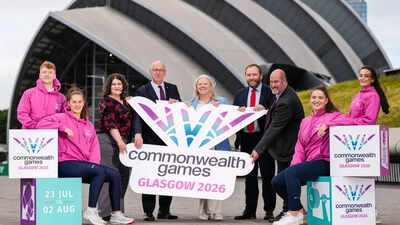ARTICLE AD BOX

Common Wealth Games 2026 (Image via: IG/X)
The Commonwealth Games Federation has confirmed that there will be no blanket ban on transgender athletes when the event returns to Glasgow next year. Instead, each sport will retain control over its own eligibility rules, meaning transgender athletes could still compete alongside biological females depending on the policies of their respective federations.The move sets up a clear divide between the Commonwealth Games and the International Olympic Committee (IOC), which is reviewing a more restrictive global framework. For now, Glasgow’s approach represents a quieter but meaningful act of resistance — a decision rooted in autonomy and inclusion rather than uniform regulation.
Commonwealth Games double down on inclusion while pledging to keep fairness at the heart of competition
In a statement, Commonwealth Sport reaffirmed its support for the IOC’s Framework on Fairness, Inclusion and Non-discrimination, stating that “everyone, irrespective of their gender identity or sex variations, must be able to practise sport in a safe, harassment-free environment.”
The federation continues to emphasize fairness without exclusion, aiming to preserve the integrity of women’s competition while honoring diversity across its ten sports.The Games’ decision recalls the 2018 controversy involving New Zealand weightlifter Laurel Hubbard, whose participation in the women’s +90kg event sparked global debate but also paved the way for policy discussions on trans inclusion. That incident left a lasting mark — one that still shapes how sporting bodies balance biological and social realities today.
The IOC’s ongoing review in Lausanne signals a potential policy shift before the 2028 Los Angeles Olympics, with insiders suggesting a move toward science-based exclusion criteria. IOC President Kirsty Coventry has emphasized the need to “protect the female category, without excluding anyone,” a balance that remains difficult to strike. While the IOC maintains that “no decisions have been taken yet,” its direction appears to lean toward restricting transgender participation — a stark contrast to the Commonwealth Games’ decentralized stance.Scotland’s political leaders remain divided on the issue. Conservative MSP Tess White argued that inclusion of transgender athletes “leads to the exclusion of women from sport,” while Scottish Greens MSP Maggie Chapman countered that such arguments spread “toxic narratives” that harm both trans and cisgender athletes.Meanwhile, several major sports — including swimming, cycling, athletics, and boxing — have already banned transgender women from female categories, while others like bowls and 3x3 basketball still align with open participation.As the IOC prepares to unveil its revised policy, Glasgow 2026 stands as a symbol of resistance and redefinition — a rare reminder that in the ever-changing world of sport, inclusion and fairness need not be rivals, but partners striving for balance.Also read: Stephen Nedoroscik spills rugby star Ilona Maher’s message for his special ‘Dancing with the Stars’ cameo

 1 hour ago
4
1 hour ago
4








 English (US) ·
English (US) ·